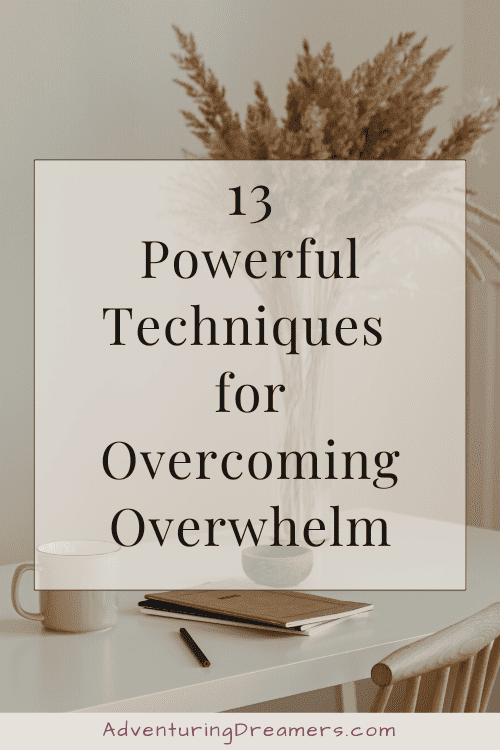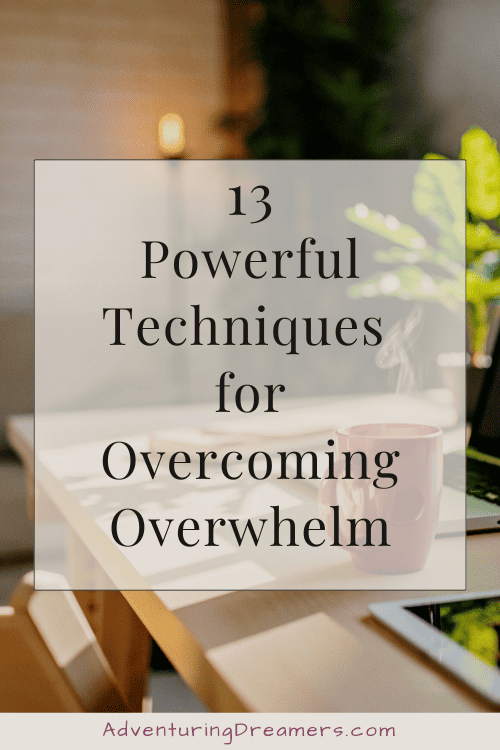13 Powerful Techniques for Overcoming Overwhelm
13 Easy But Powerful Ways to Overcome Overwhelm
Knowing how to overcome overwhelm is an essential skill to have for living a happy and fulfilled life—here are 13 techniques for overcoming overwhelm every day.
This article may contain links from our partners. We may receive a small commission if you make a purchase through a link. Please read our privacy policy to learn more about affiliate links and how we keep this blog sustainable.
Let’s be honest: we all feel overwhelmed sometimes. It’s an entirely normal part of the human experience—especially in this day and age. Between busy home lives, balancing relationships and careers, striving for ambitious goals, keeping up with social media, or simply trying to live our best lives, sometimes it all becomes a bit too much.
Overcoming overwhelm is an essential skill to have in your back pocket if you want to live a happy and fulfilled life that doesn’t lead to burnout.
Feeling overwhelmed is beginning to become normalized in our society, and that’s not a good thing. Experiencing long-term overwhelm can lead to stress, anxiety, depression, and burnout. This is why it’s so important to learn the tools and strategies that work for us to diffuse overwhelm when it comes on or even learn how to avoid it altogether.
In this blog, I’ll cover 13 of the best strategies for overcoming overwhelm. I’ll also go over the difference between overwhelm and burnout and other frequently asked questions.
You don’t have to live every day in survival mode. Many of these techniques are quick and easy to incorporate into your daily life—so you’re not just overcoming overwhelm but also learning to avoid it altogether!

How Do You Overcome Overwhelm?
Overcoming overwhelm looks different for different people. So it makes sense if you see yourself gravitating to one technique more than others. Take the techniques that resonate the most with you, then keep them in your proverbial toolbox to pull out the next time overwhelm begins to poke its ugly head out of the shadows.
1. Take a break and step away
If you’re feeling overwhelmed, your mind is likely full of too many thoughts spinning around inside your brain. You’re thinking about all the things you need to do and the very little time you have to do it.
When it feels like there’s too much on your plate, the idea of taking a break seems counterintuitive. But trust me, it’s one of the best things you can do.
You can’t cure overwhelm from a place of overwhelm.
When you’re focused on a project, it’s like you’re looking into a microscope—you’re so close to the situation that it’s hard to find the solution. But when you step back, you create separation from whatever is causing the feelings of stress. Your brain gets a break, and you can return to the situation, recharged and refreshed with a new perspective.
Mindset Tip: When taking a break, choose to do something that slows down the mind. Scrolling on social media, the news, or even playing games on your phone keeps the brain active and won’t help you in overcoming overwhelm. Instead, try walking around the block, taking a little cat nap, or meditating for 15 minutes.
2. Find peace through meditation
Creating a daily ritual that prioritizes inner peace is one of the best strategies for overcoming overwhelm. Meditation is a perfect way to do this because it produces a state of deep relaxation, leading to feelings of peace and tranquility. It can even reverse your stress response, leaving you feeling rejuvenated and ready to take on whatever made you feel overwhelmed in the first place.
3. Breathe it out
Breathing in strategic patterns stimulates the vagus nerve (the main nerve in your parasympathetic nervous system), erasing feelings of overwhelm and leaving you feeling safe and secure.
Many types of breathwork can help you in overcoming overwhelm, but here are two easy strategies:
Box Breathing
Also known as 4×4 breathing, box breathing follows the pattern of breathing in and out to the count of four. Breathe in for four seconds. Hold it for four seconds. Breathe out for four seconds. Then hold once more for four seconds.
Straw Breathing
First, breathe in through your nose for the count of four. Then, breathe out through your mouth into a straw—or imagine you have a straw and blow out through a small hole in your lips—for the count of eight. Then repeat several times until you feel the calming effect.
4. Get grounded
Grounding techniques are exercises that create space between you and the situation causing you stress. They help distract you from the situation at hand so you can refocus on the present moment. Use grounding techniques to overcome any type of stress from anxiety, depression, and, of course, overwhelm.
Here are two easy observation grounding techniques I like to use when overcoming overwhelm:
The color game
When feeling overwhelmed, take a moment to step back from what you’re doing and look around the room you’re in. Find something that is the color brown. It can be anything. Just look around until you observe something in that color. Then find something that is the color blue. And finally, find something that is the color red. And that’s it—you’re grounded!
Body meditation
Take a moment to step back from whatever overwhelms you and focus on an area of your body you don’t normally focus on. Zoom in on your toes and notice how they feel in your shoes. Think about the tips of your ears and see if you can feel them. Notice your belly button. It might seem silly, but trust me—it works.
Mindset Tip: You can incorporate meditation, breathing, and grounding practices into your daily routine to help prevent overwhelm. They’re also useful tools to keep in your metaphorical tool belt to pull out when feelings of overwhelming present themselves.
5. Set boundaries
Time is the only resource that is truly unrenewable. Once spent, there’s no way to get time back. At least, not that we’ve figured out yet.
So make sure you’re spending time in a way you feel good about.
One of the best strategies to overcoming overwhelm is to schedule your time in a way that focuses on your wants and needs first, so you aren’t resentful of saying yes to things when your calendar is already full.
Remember, if something isn’t in alignment for you, it isn’t for the other person, either. So, if you really don’t want to go to the BBQ at Jessie’s house, don’t feel obligated to say yes just to be polite. The same goes for accepting a new client when you’re already working double time. Staying in control of your schedule and creating healthy boundaries is essential for your well-being.
Mindset Tip: Set boundaries around social media and the news as well. It might feel like you’re taking a break when scrolling online, but your brain stays active as it simultaneously takes in thousands of bits of information. Set a daily limit for how much time you allow yourself to scroll, which could help in overcoming your overwhelm, too.
6. Acknowledge and clear
When you’re overwhelmed, your mind feels like a tumble dryer of thoughts and emotions spinning around uncontrollably. Leaning into that whirly-twirly feeling isn’t going to help us in overcoming overwhelm, but getting in control of our state of mind will. One way to regain control is to acknowledge what you’re feeling so you can clear it and let those feelings go.
Emotional Freedom Technique (EFT) is a powerful exercise that comes from the same roots as the Traditional Chinese Medicine practice of acupuncture. It’s used as a form of modern psychology to acknowledge and clear feelings of stress, anxiety, and overwhelm.
EFT works by tapping on certain pressure points on your body and saying a script acknowledging what you’re going through. The script walks your mind through acknowledgment, acceptance, and release. You can learn more about EFT here.

7. Reframe your thoughts
Meet your overwhelm at its source and reframe your triggering thoughts. These negative or low vibrational thoughts make you feel like you’re out of control and have too much going on. They’re the foundation of your overwhelm.
Play the scientist in your mind by observing your thoughts and asking:
- Are these thoughts helpful?
- Are they reasonable and realistic?
- Would I think the same thing if a loved one were in my situation?
If the answer is no, then it’s time to change those thoughts.
For example, instead of thinking, “I’ll never get this done,” place this thought under a microscope and recognize:
- This thought is not helpful nor adding to your productivity.
- It also isn’t true. Never is a non-existent time frame, and depending on the task, you’ll likely get it done eventually.
- If a loved one were in your situation, you probably wouldn’t be as hard on them as you’re being on yourself.
Give yourself some compassion, and then flip these overwhelming thoughts upside down. Reframe “I’ll never get this done” to “I’ll get as much done as I can, and that’s okay,” or “I can ask for an extension,” or even ask for help if you need to. Sometimes overcoming overwhelm is as simple as reframing your thoughts into something more productive.
8. Change your state of being
Getting out of your head and into your body not only forces you to take a break from whatever is making you feel overwhelmed, but it can change your state of being—literally releasing helpful hormones to improve your mood and help you let go of stressful feelings.
- Superman stance—Harvard professor Amy Cuddy did a study that showed that standing in a power pose with your hands on your hips for two minutes could decrease your cortisol, which is the primary stress hormone in your body.
- Shake it off—Studies have also shown that shaking or dancing can activate the parasympathetic nervous system and lower cortisol levels.
- Move outside—Moving your body in any way can be helpful in overcoming overwhelm. And going for a walk outside exposes you to nature, which has also been shown to be helpful in lowering stress.
Other forms of movement like yoga, pilates, or cardio will also help change your state of being. Anything you can do to get out of your head and ground back into your body will be helpful in overcoming overwhelm.
9. Take care of your body
Not only is taking care of your body essential to stay healthy, but it’s also useful in overcoming overwhelm. Take a break to take care of yourself. You’ll come back refreshed and ready to tackle your list in a more productive frame of mind.
Here are a few helpful tips to help you take care of your body and reduce overwhelm:
- Eat anti-inflammatory foods like kale, spinach, and broccoli to boost your body’s nutrients and increase brain health.
- Pause your work to drink some water and improve your mental performance.
- Take a shower to separate yourself from the stressful situation and refresh your mind so you can return to your work relaxed and sans overwhelm.
- Go for a walk or do yoga to take a break, move your body, and get some helpful hormones flowing.
You deserve to be taken care of. And the fact that this will help alleviate overwhelm is a pretty awesome bonus.
10. Let go of the need for control
Sometimes overcoming overwhelm means letting go of the need for control. I totally understand the desire to do everything yourself, but sometimes asking for help or delegating is the most productive thing you can do.
Feelings of overwhelm often come from having so much on our to-do list that it feels impossible to get everything done. So ask yourself, “What’s on my list that someone else can do instead?”
Ask your partner or kids for help around the house. Talk with your manager about restrategizing your workload. If you own a business, delegate tasks to an assistant or hire a freelancer.
Sometimes it’s hard to ask for help because you’re afraid it will make you look like a failure. But the fact is knowing your limits and delegating tasks when you can is one of the best tools to help boost your success.
10. Brain dump it out
If it ever feels like you’ve got so many thoughts running through your head at one time that you can’t concentrate on anything, then you’ll love using the brain dump technique to help you in overcoming overwhelm.
At the beginning of every week, take a few minutes to “dump out” your thoughts about what you want to get done. Once everything is written out on a list, you can go over the list and organize your thoughts into a plan for the week.
You can also keep a pen and paper next to your desk, and every time a new thought of something that needs to be done pops into your brain, write it down on the list so you can “forget” about it for now and organize it into your schedule during your planning session later on. This is a valuable strategy if you’re the type of person who often jumps around between unfinished tasks as you think of them.
11. Prioritize
Building off of the brain dump technique, use a prioritizing strategy to organize your to-do list in an effective way that won’t cause overwhelm. You can:
- Eat the Frog—one of my favorite techniques for overcoming overwhelm comes from the book Eat That Frog. It’s where you plan to do the hardest and most important thing on your to-do list first. Hint: it’s usually the thing you normally avoid for as long as possible. If you do it first, you won’t have to deal with the stress of procrastination. Plus, everything else on your list will be a breeze because the hardest thing is already done.
- Time block—blocking out time in the day for important tasks ensures you get them done instead of procrastinating or multitasking.
- Delete unnecessary items—Look over your to-do list and determine if any items on your list are unnecessary. If you can mark any unimportant and non-urgent, cross them off. There’s no need to overwhelm yourself with non-essential tasks.
12. Acknowledge your wins and reframe the idea of perfection
If you’re feeling overwhelmed, I bet you’re not giving yourself the credit you deserve. Look back over your day or week and reflect on everything you’ve already accomplished. I bet you’ve done a lot more than you think. Acknowledging these as wins helps boost your confidence, ignite motivation, and help you in overcoming your overwhelm.
Additionally, it’s important to let go of the perfectionist mindset. Perfection is subjective. Therefore, it doesn’t even exist. You’ll never get it done if you wait to complete a task until it’s perfect. Adopt the phrase, “Done is better than perfect,” and then allow yourself to move on.
13. Be kind to yourself
In overcoming overwhelm, it’s important to be kind to yourself. Remember, it’s normal to feel overwhelmed sometimes, and everyone has experienced it. There’s nothing wrong with you for feeling this way.
Also, now you know these techniques, you have the ability to conquer overwhelm like the total badass you are. Give yourself some compassion like you would for a friend who was in your position. Then see what you can do to help make things easier for yourself—delete unnecessary items, delegate, extend deadlines, and prioritize your mental health.

Frequently Asked Questions About Overcoming Overwhelm
So now that we’ve covered what to do if you’re overwhelmed, let’s go over some important frequently asked questions about why overwhelm happens.
How Do You Know If You’re Overwhelmed?
You might be overwhelmed if you’re feeling more stressed than usual. When you’re overwhelmed, your emotions are heightened, and you might feel guilt, frustration, bitterness, or anger in regard to how many responsibilities are on your plate. You might have a hard time concentrating on tasks. Your body also might show signs, such as a racing heart or difficulty breathing.
What Is the Difference Between Overwhelm and Burnout?
If you feel stress and heightened emotions around the tasks you’re trying to juggle, you’re likely overwhelmed. But if you’re feeling a sense of numbness or dread and feel like there’s no hope in completing your responsibilities, then you’re likely feeling burnout.
If you’re feeling burnout, remember you’re the most important part of your life, and your mental health comes before anything else. Take a break and focus on self-care, get support from friends and family, or seek professional help.
What Leads To Overwhelm?
Overwhelm usually results from feeling like you’ve got too many responsibilities to cover. This often happens if you don’t know your limits and take on too much—or if you know your limits but don’t respect them.
It can also be the result of unrealistic expectations or a perfectionist mindset. Remember, no one is perfect, and striving for perfection is pointless.
Overwhelm might come from putting too much pressure on yourself. This might happen if you identify as an overachiever or were praised for overachievement as a child.
Fear of losing control can also cause overwhelm because it can hold you back from delegating or asking for help.
What Does Overwhelm Do to the Brain?
Chronic feelings of overwhelm can affect the brain in less-than-ideal ways. Feeling overwhelmed can cause mental fatigue, forgetfulness, muddled thoughts, difficulty concentrating, impairment in logical thinking, and struggles in problem-solving.
Without overcoming overwhelm, cognitive fatigue can also occur, which can cause added stress and distracted thinking.
How To Overcome Overwhelm for Good?
The best strategy to overcoming overwhelm for good is to put your mental and physical health first. Become aware of what triggers feelings of overwhelm and organize your life and responsibilities in a way that is helpful to you.
Overcoming Overwhelm Is a Work in Progress
Everyone faces overwhelm from time to time. Overcoming overwhelm for good takes a lot of awareness and practice. Be patient with yourself and use the strategies listed in this article to create a daily ritual for inner peace.
You now have the tools needed to help in overcoming overwhelm. Practice these techniques and discover which ones work best for you. Keep them in your metaphorical toolbelt to use whenever you need them.

Additional Resources:
Mindset Guides:
The Complete Guide to Limiting Beliefs and How To Conquer Them
Meditation for Beginners: 9 Steps on How to Clear Your Mind
How to Lower Your Anxiety Now: 5 Easy Hacks You Can Use in the Moment
Books to Grow Your Mindset:
These are books that transformed my life and led me to where I am today, and I am confident they’ll do the same for you.
Think and Grow Rich by Napoleon Hill
Outwitting the Devil by Napoleon Hill
The Big Leap: Conquer Your Hidden Fear and Take Life to the Next Level
The Complete Wallace D. Wattles Collection
Click Here to see more from the Adventuring Dreamers Resources.






